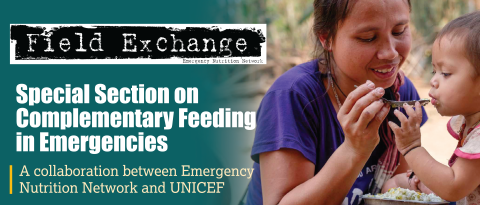Update on the GNC Technical Alliance Global Thematic Working Groups
The Global Nutrition Cluster Technical Alliance (the Alliance) aims to provide predictable, timely and coordinated nutrition technical assistance to meet the nutrition needs of people affected by and at risk of emergencies. The Alliance's primary function is to provide technical advice, facilitate rapid, consensus-driven stop-gap guidance in the absence of established normative guidance, and provide specialised technical expertise. The mechanism is led by UNICEF and co-led by World Vision, with a leadership team including the Global Nutrition Cluster Coordination Team, ENN, and Action Against Hunger.
Within the Alliance, the Global Thematic Working Groups (GTWGs) are groups of key experts convening to develop timely consensus-driven, technical stop-gap guidance. There are currently five GTWGs centred around various thematic areas, namely infant feeding in emergencies (IFE) (for which the IFE Core Group acts as the GTWG), wasting, nutrition information systems (NIS), and nutrition and cash and voucher assistance (CVA) as well as a newly established management of small and nutritionally at-risk infants under six months and their mothers (for which the MAMI Global Network has agreed to fill the role of the GTWG). Additionally, two time-bound taskforces have been established to develop guidance on nutrition in Ebola treatment units and women’s nutrition in emergencies.
Over the course of this year to date, in response to escalated questions from Ethiopia, Ukraine, Afghanistan, Yemen, Nigeria, and Haiti, the GTWGs have developed various guidance documents and learning pieces. While not all can be mentioned here, there follows some of the highlights. The IFE Core Group has developed nuclear radiation and chemical/biological warfare incidence guidance1 for appropriate IFE responses, as well as country level case studies on complementary feeding in emergencies. The Wasting GTWG has been supporting the mapping of national wasting guidelines, wasting prevention initiatives, and an analysis of the cost of not treating wasting as well as harmonising costing and cost effectiveness methodologies. The NIS GTWG has established country focused taskforces to support national nutrition survey planning and data quality verification in several specific countries. The CVA GTWG has mapped out promising practices and ways of overcoming challenges in CVA for nutrition programming and developed related capacity building tools.
As nutritional needs are expected to grow in many contexts over the coming months, the Alliance remains committed to responding to in-country technical needs and supporting country level practitioners.
Should you need technical guidance, please reach out using the Alliance’s request page, at https://ta.nutritioncluster.net/request-support


